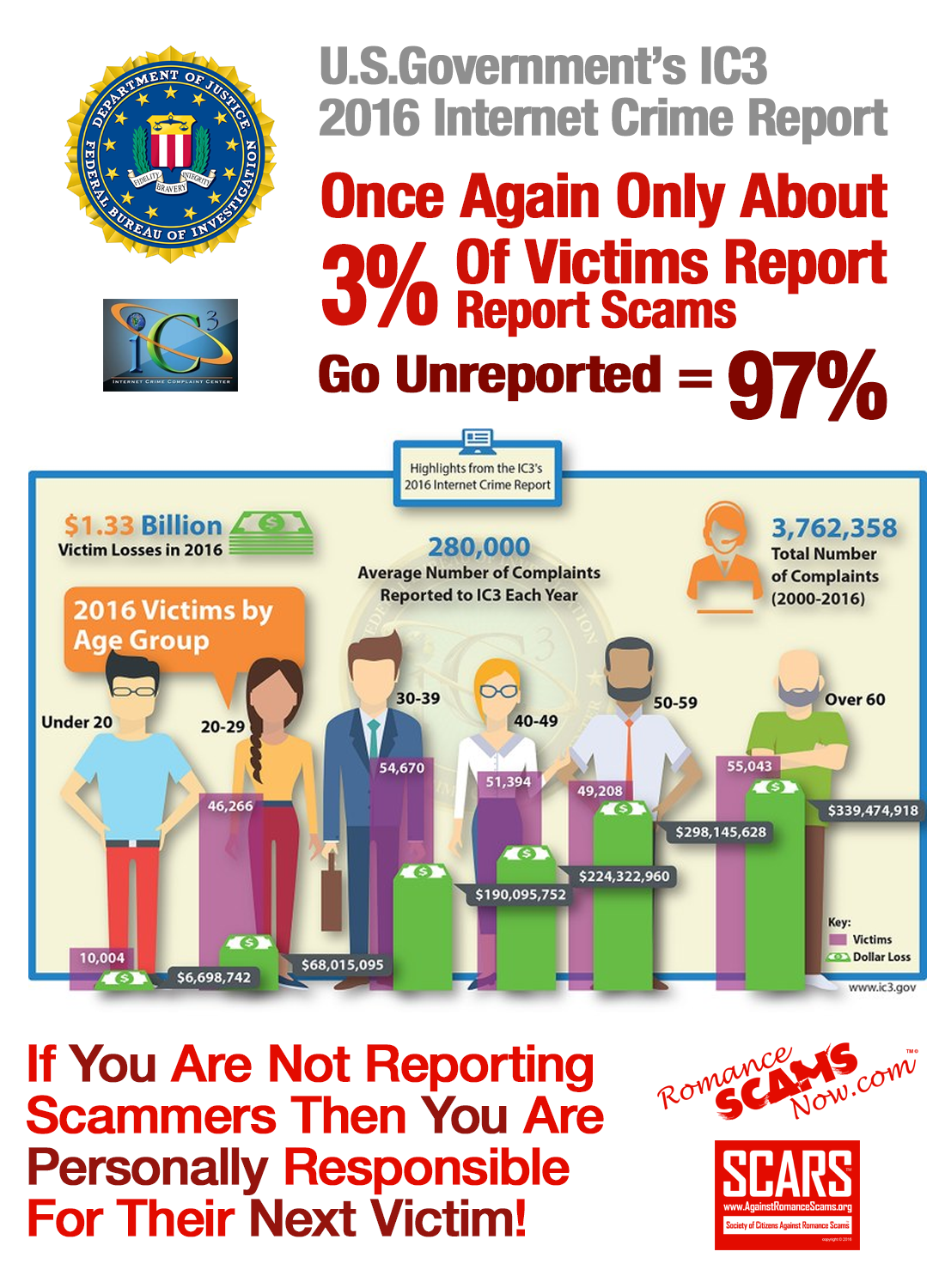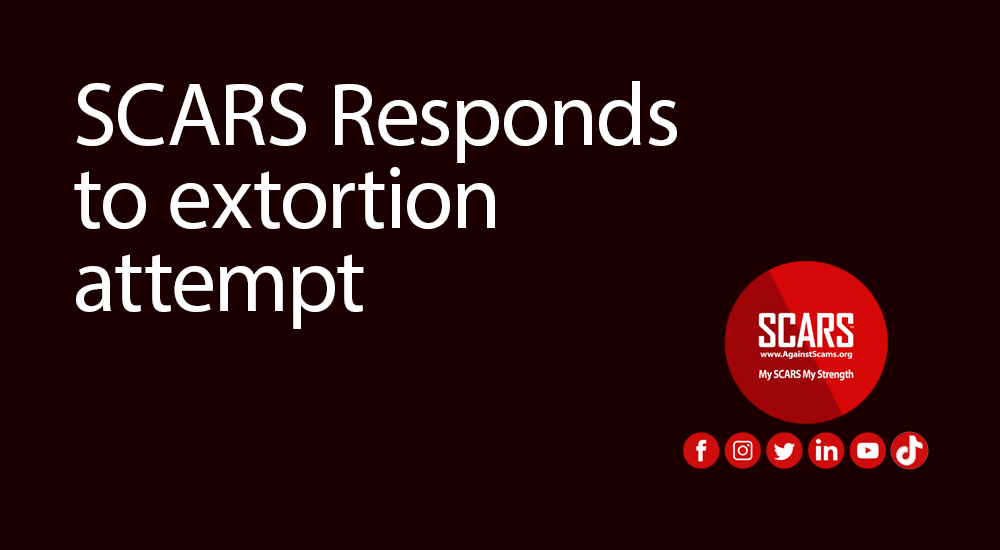
SCARS Institute’s Encyclopedia of Scams™ Published Continuously for 25 Years

2016 Internet Crime Report
The United States Department of Justice’s Internet Crime Complaint Center (IC3) Releases Their Annual Report Highlighting Trends in Internet Crime
As usual, only about 3% of victims will report their crime to the government. So the result is that 97% of the numbers are unknown to them.
The result of the constant under-reporting by victims is that government neither fully understands the scope and magnitude of these crime, and they also do not know how to prioritize resources to stop them. The result is that every victim that fails to report these crimes is further enabling the scammers and online criminals to go after another person.
Think about that for a moment?
By not reporting the crime YOU are allowing the scammers and the criminals to get away with it.
Here are the highlights from the IC3 Report:
Giving someone access to your computer is like giving out a key to your front door. A computer can have your bank account information, family photos, and other private documents and data—information that fraudsters would like to steal. That’s why tech support fraud has become a significant trend in online crime, according to the 2016 Internet Crime Report from the FBI’s Internet Crime Complaint Center (IC3).
In tech support fraud cases, criminals convince unsuspecting victims to provide remote access to their computer by calling and posing as tech support personnel from a legitimate company. The criminal can then simply charge your credit card for a fake anti-virus product, or, in more sinister situations, they can steal your personal information or install malware. More than 10,000 incidents of tech support fraud were reported to the IC3 in 2016, with victims losing nearly $8 million. Though anyone can be a victim, older computer users are the most vulnerable targets.
“They’ll trick you into letting them into your computer,” said IC3 Unit Chief Donna Gregory. “You open the door and allow them in. You may think you’re just watching them install a program to get rid of a virus, but they are really doing a lot of damage behind the scenes.”
In addition to tech support fraud, the other major fraud categories last year were business e-mail compromise, ransomware, and extortion.
The IC3 receives complaints on a variety of Internet scams and crimes, and it has received more than 3.7 million complaints since it was created in 2000. In 2016, the IC3 received a total of 298,728 complaints with reported losses in excess of $1.3 billion. The IC3 uses the information from public complaints to refer cases to the appropriate law enforcement agencies and identify trends. The IC3’s extensive database is also available to law enforcement. Internet users should report any Internet fraud to IC3, no matter the dollar amount. Additional data helps the FBI and law enforcement gain a more accurate picture of Internet crime.
The IC3 publishes the Internet Crime Report annually to increase public awareness of current trends in Internet crime. For this report, the IC3 has also created a separate state-by-state breakdown that allows users to select their state from a dropdown menu so they can review local trends in Internet crime. The top states for reported dollar amounts lost to Internet fraud in 2016 were California ($255 million), New York ($106 million), and Florida ($89 million).
Though Internet crime is a serious threat, there are ways to help keep yourself safe online. The IC3 recommends computer users update their anti-virus software and operating system. Additionally, the Internet is an especially important place to remember the old adage: If it sounds too good to be true, it probably is.
“Be aware of what you are clicking on and also what you’re posting on social media. Always lock down your social media accounts as much as possible,” Gregory said. “Try to use two factor authentication, and use safe passwords or things more difficult to guess. The tougher the password, the harder it is for someone to crack.”
If you would like to read the actual PDF report CLICK HERE »
For more information or to submit a complaint, visit www.ic3.gov AND also report it at www.Anyscam.com or this website too!
-/ 30 /-
What do you think about this?
Please share your thoughts in a comment below!
LEAVE A COMMENT?
Recent Comments
On Other Articles
- velma faile on Finally Tax Relief for American Scam Victims is on the Horizon – 2026: “I just did my taxes for 2025 my tax account said so far for romances scam we cd not take…” Feb 25, 19:50
- on Reporting Scams & Interacting With The Police – A Scam Victim’s Checklist [VIDEO]: “Yes, this is a scam. For your own sanity, just block them completely.” Feb 25, 15:37
- on Danielle Delaunay/Danielle Genevieve – Stolen Identity/Stolen Photos – Impersonation Victim UPDATED 2024: “She goes by the name of Sanrda John now” Feb 25, 10:26
- on Reporting Scams & Interacting With The Police – A Scam Victim’s Checklist [VIDEO]: “So far I have not been scam out of any money because I was aware not to give the money…” Feb 25, 07:46
- on Love Bombing And How Romance Scam Victims Are Forced To Feel: “I was love bombed to the point that I would do just about anything for the scammer(s). I was told…” Feb 11, 14:24
- on Dani Daniels (Kira Lee Orsag): Another Scammer’s Favorite: “You provide a valuable service! I wish more people knew about it!” Feb 10, 15:05
- on Danielle Delaunay/Danielle Genevieve – Stolen Identity/Stolen Photos – Impersonation Victim UPDATED 2024: “We highly recommend that you simply turn away form the scam and scammers, and focus on the development of a…” Feb 4, 19:47
- on The Art Of Deception: The Fundamental Principals Of Successful Deceptions – 2024: “I experienced many of the deceptive tactics that romance scammers use. I was told various stories of hardship and why…” Feb 4, 15:27
- on Danielle Delaunay/Danielle Genevieve – Stolen Identity/Stolen Photos – Impersonation Victim UPDATED 2024: “Yes, I’m in that exact situation also. “Danielle” has seriously scammed me for 3 years now. “She” (he) doesn’t know…” Feb 4, 14:58
- on An Essay on Justice and Money Recovery – 2026: “you are so right I accidentally clicked on online justice I signed an agreement for 12k upfront but cd only…” Feb 3, 08:16
ARTICLE META
Important Information for New Scam Victims
- Please visit www.ScamVictimsSupport.org – a SCARS Website for New Scam Victims & Sextortion Victims
- Enroll in FREE SCARS Scam Survivor’s School now at www.SCARSeducation.org
- Please visit www.ScamPsychology.org – to more fully understand the psychological concepts involved in scams and scam victim recovery
If you are looking for local trauma counselors please visit counseling.AgainstScams.org or join SCARS for our counseling/therapy benefit: membership.AgainstScams.org
If you need to speak with someone now, you can dial 988 or find phone numbers for crisis hotlines all around the world here: www.opencounseling.com/suicide-hotlines
A Note About Labeling!
We often use the term ‘scam victim’ in our articles, but this is a convenience to help those searching for information in search engines like Google. It is just a convenience and has no deeper meaning. If you have come through such an experience, YOU are a Survivor! It was not your fault. You are not alone! Axios!
A Question of Trust
At the SCARS Institute, we invite you to do your own research on the topics we speak about and publish, Our team investigates the subject being discussed, especially when it comes to understanding the scam victims-survivors experience. You can do Google searches but in many cases, you will have to wade through scientific papers and studies. However, remember that biases and perspectives matter and influence the outcome. Regardless, we encourage you to explore these topics as thoroughly as you can for your own awareness.
Statement About Victim Blaming
SCARS Institute articles examine different aspects of the scam victim experience, as well as those who may have been secondary victims. This work focuses on understanding victimization through the science of victimology, including common psychological and behavioral responses. The purpose is to help victims and survivors understand why these crimes occurred, reduce shame and self-blame, strengthen recovery programs and victim opportunities, and lower the risk of future victimization.
At times, these discussions may sound uncomfortable, overwhelming, or may be mistaken for blame. They are not. Scam victims are never blamed. Our goal is to explain the mechanisms of deception and the human responses that scammers exploit, and the processes that occur after the scam ends, so victims can better understand what happened to them and why it felt convincing at the time, and what the path looks like going forward.
Articles that address the psychology, neurology, physiology, and other characteristics of scams and the victim experience recognize that all people share cognitive and emotional traits that can be manipulated under the right conditions. These characteristics are not flaws. They are normal human functions that criminals deliberately exploit. Victims typically have little awareness of these mechanisms while a scam is unfolding and a very limited ability to control them. Awareness often comes only after the harm has occurred.
By explaining these processes, these articles help victims make sense of their experiences, understand common post-scam reactions, and identify ways to protect themselves moving forward. This knowledge supports recovery by replacing confusion and self-blame with clarity, context, and self-compassion.
Additional educational material on these topics is available at ScamPsychology.org – ScamsNOW.com and other SCARS Institute websites.
Psychology Disclaimer:
All articles about psychology and the human brain on this website are for information & education only
The information provided in this article is intended for educational and self-help purposes only and should not be construed as a substitute for professional therapy or counseling.
While any self-help techniques outlined herein may be beneficial for scam victims seeking to recover from their experience and move towards recovery, it is important to consult with a qualified mental health professional before initiating any course of action. Each individual’s experience and needs are unique, and what works for one person may not be suitable for another.
Additionally, any approach may not be appropriate for individuals with certain pre-existing mental health conditions or trauma histories. It is advisable to seek guidance from a licensed therapist or counselor who can provide personalized support, guidance, and treatment tailored to your specific needs.
If you are experiencing significant distress or emotional difficulties related to a scam or other traumatic event, please consult your doctor or mental health provider for appropriate care and support.
Also read our SCARS Institute Statement about Professional Care for Scam Victims – click here to go to our ScamsNOW.com website.











![SCARS™ Special Report: Rubberband Bank Wire Transfer Scams [Infographic] rubberband bank wire trasnfer scams SCARS™ Special Report: Rubberband Bank Wire Transfer Scams [Infographic] rubberband bank wire trasnfer scams](https://romancescamsnow.com/wp-content/uploads/2019/10/rubberband-bank-wire-trasnfer-scams.png)





Thank you for your comment. You may receive an email to follow up. We never share your data with marketers.